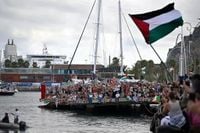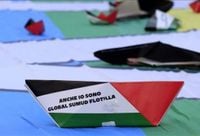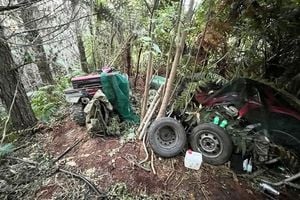The Mediterranean has become the stage for a rare and dramatic act of global solidarity, as the Global Sumud Flotilla—a convoy of nearly 20 ships carrying activists from 44 nations—makes its final preparations in Tunisia before attempting to break Israel’s blockade of Gaza. The humanitarian mission, which set sail from Barcelona on August 31, 2025, has drawn together a strikingly diverse coalition: from Swedish climate activist Greta Thunberg to Pakistani Senator Mushtaq Ahmad Khan, and from Indonesian volunteers to prominent figures like Nelson Mandela’s grandson, Mandla Mandela, and French actress Adèle Haenel. Their shared goal? To deliver desperately needed aid to Gaza and shine a spotlight on a humanitarian crisis that international monitors recently declared a famine in northern Gaza.
According to Reuters, the first wave of ships arrived at the port of Sidi Bou Said, just outside Tunis, on Sunday, September 7. Crowds of Tunisians lined the docks to welcome the boats, which had journeyed from Spain and Italy. Organizers say around 20 vessels are expected to dock in Tunisia over the next two days, with Tunisian boats set to join the convoy when it departs for Gaza on September 10. Additional vessels are expected to link up off the Italian coast, creating a formidable show of international unity.
Senator Mushtaq Ahmad Khan, who is traveling with campaigners from Australia, Bahrain, Belgium, Germany, Indonesia, Ireland, Italy, Kuwait, the Maldives, Luxembourg, Oman, Norway, Spain, and Thailand, described the mission as "the largest siege-breaking humanitarian convoy in history." On social media, he declared, "Israel is issuing threat after threat, but no one is backing down." The sense of urgency is palpable among the roughly 150 activists on board, who include Tunisians, Turkish citizens, and campaigners from across Europe, Africa, and Asia.
The flotilla’s organizers are clear about their purpose: to draw global attention to the worsening humanitarian disaster in Gaza. Since March 2025, Israel has maintained a tight blockade, allowing only limited aid deliveries into the territory. The toll has been devastating. International monitors declared famine in northern Gaza last month, and the ongoing conflict—now nearly two years old—has resulted in the deaths of almost 64,400 Palestinians since October 2023, according to figures cited by The Express Tribune.
Indonesia’s contribution to this mission stands out for its depth and symbolism. Five Indonesian vessels—named Soekarno, Diponegoro, Hasanuddin, Pati Unus, and Malahayati—sail as part of the convoy. Each is named after a national hero, figures who once led resistance against colonial powers or naval blockades. As Middle East Monitor reports, these ships carry more than aid; they carry a message rooted in Indonesia’s own history of struggle and solidarity. More than 30 Indonesian volunteers are on the water, while many more are stationed in Tunis to provide logistical support.
At the flotilla’s Tunis send-off, Indonesia’s ambassador to Tunisia, Zuhairi Misrawi, praised the volunteers as "fighters whose names will be etched in both national and humanitarian history." The Indonesian Foreign Ministry has coordinated with embassies in Tunis, Cairo, and Rome to ensure the safety of those on the flotilla, acknowledging the risks inherent in such a mission. For Indonesia, the cause is deeply personal: the country has never normalized ties with Israel and recognized Palestine back in 1988. As the Middle East Monitor editorial notes, "For Indonesians, Palestine is not a distant cause; it is a mirror. It is the same cry: the right to live free of occupation."
The mission has also drawn support from Pakistani organizations, with social media posts from Tahreek-e-Azadi Palastine Pakistan hailing the delegation’s participation and urging followers to "join hands to support this mission." The Pakistani vessel, along with others, is scheduled to depart from Tunisia as part of the main convoy. The sense of shared purpose is echoed by activists from dozens of other countries, all united by the belief that silence in the face of Gaza’s suffering is itself a form of complicity.
The logistics of the operation are daunting. After arriving in Tunis, the flotilla plans to remain in port for two days to stock up on food and water before setting sail for Gaza. Organizers say the ships will be joined by additional vessels as they pass the Italian coast, increasing the convoy’s size and visibility. The mission is not without risk: Israel has issued repeated warnings, and the fate of previous aid flotillas—some of which were intercepted or boarded by Israeli forces—looms large in the minds of participants. Yet, as Wael Nawar of the Maghreb flotilla steering committee told Anadolu, "The ships that left Spain have started entering Tunisian waters," underscoring the determination of those involved.
For many, the flotilla represents more than just a delivery of aid. It is a direct challenge to what activists call an "illegal blockade" that has starved two million Palestinians and "strangles life in Gaza," as described by Middle East Monitor. The mission is a testament to the power of civil society and the enduring appeal of solidarity in the face of institutional paralysis. "When institutions fail, people must act," the editorial asserts, arguing that the mission has "already succeeded" by exposing the blockade "not as 'security' but as cruelty."
The symbolism of the Indonesian vessels, named after figures who resisted imperial domination, resonates deeply with the broader goals of the flotilla. "Today, those names sail again, binding past struggles to present ones," Middle East Monitor writes. The mission is a reminder that, as the editorial puts it, "history is not written by those who wait—it is written by those who sail."
As the departure date approaches, all eyes are indeed on Gaza. The convoy’s progress is being closely watched by supporters and critics alike, with many wondering whether the ships will be allowed to reach their destination or face interception. Whatever the outcome, the Global Sumud Flotilla has already made its mark, uniting activists from across the world in a daring bid to break the siege and deliver hope to a region in desperate need.
The Mediterranean, restless as ever, now carries not just ships, but the aspirations of people who refuse to be silent. Their journey is a powerful reminder that, even in the face of overwhelming odds, solidarity can still set sail—and sometimes, that’s enough to change the course of history.





